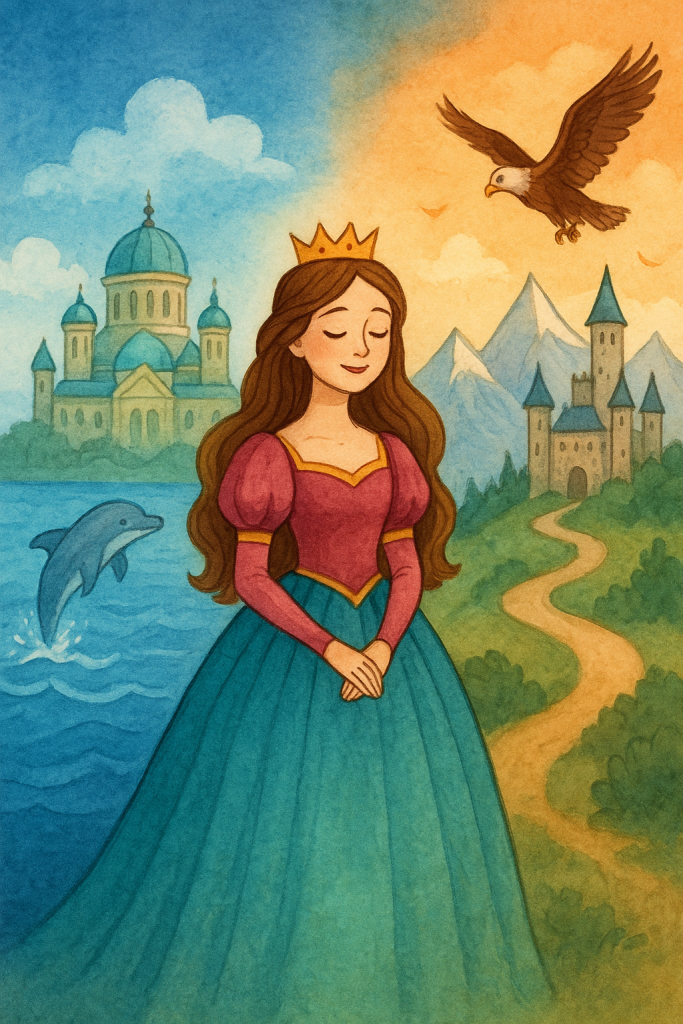Thank you, Bobby, for your wonderful story and for being such an inspiring part of our international network!
November 14, 2025 from Bobby
Принцесата от двете кралства
Имало една принцеса, която била принцеса на две кралства. Тя била наследница на два велики рода – родът на морското кралство и родът на планинските върхове. Принцесата била много щастлива ще е има два двореца. На две места за нея се грижели прекрасни придворни дами. Има два гардероба с прекрасни рокли. И била обичана и обгрижвана и на двете места. Единственият проблем в двете кралства била разликата във въздуха – долу в морското кралство въздухът бил плътен, налагало се да използва магическата си сила, за да диша под вода , за да стигне до замъка и някак налягането било по – тежко, от водата над замъка. Горе пък, в кралството на планинските върхове въздухът бил разреден, и тялото и се нуждаело от време , за да се адаптира към двете места. Но ползите били прекрасни – тя летяла на крилете на орлите, плувала заедно и върху красиви делфини – в зависимост от това, в кое кралство се намирала. Вярно, понякога се будела нощем и търсела делфините, когато осъзнавала, че някой прекрасен орел я очаква за среднощна разходка, но бързо се справяла с това.
И в двете кралства имало по една забранена за принцесата зона – тъмни места, в които живеели вещици. Царедворците и в двете кралства се страхували, че ако принцесата отиде там, ще я отвлекат или отровят, че ще и сторят нещо, затова не пускали да иде там.
Нашата принцеса, обаче била приключенка и един ден, докато седяла в двореца в морското кралство, решила че ще отиде до забраненото място. Там видяла прекрасни жени, прилични на русалки, били красиви и вълшебни и тя се влюбила в тях. Решила да им се покажи, а те толкова се зарадвали, че я виждат, че я прегърнали и затанцували с нея. Не ѝ направили нищо лошо и тя поискала да остане при тях известно време. Те я приели и я научили да прави вълшебни отвари , с които да лекува хората и красиви щитове, които да я пазят от всякакво зло. Скоро и домъчняло за семейството ѝ и тя се прибрала у дома . Там били много уплашени , но се успокоили, когато видели, че е добре. Порадвали ѝ се и я изпратили в кралството на високите върхове. Там тя се забавлявала, но любопитството ѝ отново надделяло и тя решила да отиде при вещиците и в това кралство. Царедворците били предупредени, че е била при вещиците в морското кралство и я охранявали доста добре. Но с помощта на най – верния си паж, тя успяла да се измъкне и отишла при тяхното място. Там видяла прекрасни и красиви самодиви, които ѝ казали, че са много щастливи да я видят и че принцеса на две кралства се ражда веднъж на 1000 години и че това че тя съществува означава, че юе има мир, любов и благоденствие през следващите 1000 години. Тя останала доброволно прия тях и те я научили да приготвя вълшебни ястия, с които да прави хората щастливи и да използва думите, така че да може да лекува вътрешния свят и тревогите на хората. Когато била научена на всичко, тя се прибрала в кралството, където я посрещнали с тревога, но скоро разбрали, че всичко с нея е наред. Оттогава на вещитите от двете кралства било позволено да ходят където си искат и да лекуват хората, а принцесата била техен обединител. И се сбъднало пророчеството всички да живеят щастливо следващите 1000 години.
За дете, което живее 2 седмици при единия си родител, 2 седмици при другия. И двамата родители имат партньори.
The Princess of Two Kingdoms
Once upon a time, there was a princess who was a princess of two kingdoms. She was the heir of two great lineages – the lineage of the sea kingdom and the lineage of the mountain peaks. The princess was very happy to have two palaces. In both places, she was cared for by wonderful court ladies. She had two wardrobes with beautiful dresses and was loved and cared for in both places. The only problem in the two kingdoms was the difference in air – down in the sea kingdom, the air was dense, and she had to use her magical power to breathe underwater to reach the castle, and somehow the pressure was heavier due to the water above the castle. Meanwhile, in the kingdom of the mountain peaks, the air was thin, and her body needed time to adapt to both places. But the benefits were wonderful – she flew on the wings of eagles and swam alongside and on beautiful dolphins, depending on which kingdom she was in. True, sometimes she would wake up at night looking for the dolphins, only to realize that a magnificent eagle awaited her for a midnight stroll, but she quickly managed this.
In both kingdoms, there was a forbidden zone for the princess – dark places where witches lived. The courtiers in both kingdoms feared that if the princess went there, she would be kidnapped or poisoned, that something would happen to her, so they did not allow her to go there.
However, our princess was adventurous, and one day, while sitting in the palace in the sea kingdom, she decided to go to the forbidden place. There she saw beautiful women resembling mermaids, they were enchanting and magical, and she fell in love with them. She decided to reveal herself to them, and they were so delighted to see her that they hugged her and danced with her. They did her no harm, and she asked to stay with them for a while. They welcomed her and taught her to make magical potions to heal people and beautiful shields to protect her from any evil. Soon, she missed her family and returned home. They were very worried but calmed down when they saw she was well. They rejoiced at her return and sent her to the kingdom of the high peaks. There she enjoyed herself, but her curiosity got the better of her again, and she decided to visit the witches in this kingdom too. The courtiers had been warned that she had visited the witches in the sea kingdom and guarded her well. But with the help of her most loyal page, she managed to slip away and went to their place. There she saw beautiful and enchanting fairies who told her they were very happy to see her and that a princess of two kingdoms is born once every 100 years and that her existence meant there would be peace, love, and prosperity for the next 100 years. She stayed with them willingly, and they taught her to prepare magical dishes to make people happy and to use words to heal the inner world and worries of people. When she had learned everything, she returned to the kingdom, where she was greeted with concern, but they soon realized that everything was fine with her. From then on, the witches from both kingdoms were allowed to go wherever they wanted and heal people, with the princess as their unifier. And the prophecy came true for everyone to live happily for the next 100 years.
This story can be interpreted as a metaphor for a child who lives two weeks with one parent and two weeks with the other. Both parents have partners.







